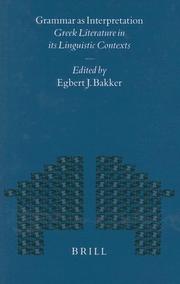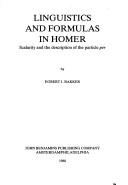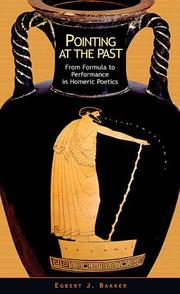| Listing 1 - 10 of 23 | << page >> |
Sort by
|

ISBN: 9004107304 9004330062 9789004107304 9789004330061 Year: 1997 Volume: 171 Publisher: Leiden ; New York : Brill,
Abstract | Keywords | Export | Availability | Bookmark
 Loading...
Loading...Choose an application
- Reference Manager
- EndNote
- RefWorks (Direct export to RefWorks)
Looking at its subject from the standpoint of modern discourse analysis, this study deals with problems of style and grammar in Greek and Latin texts. Its aim is to shed light on the interaction between the mechanism of the Greek and Latin languages as interactive tools and the structure of the texts that have come down to us. The interpretive orientation offered differs from most literary studies in its taking linguistic observations as point of departure, and its considering grammar as a positive factor in the interpretive process. It differs from most linguistic studies in the field in demonstrating the importance of linguistic methodology for classical philology in general. The book contains studies of various authors, genres, and text types, preceded by an introductory essay on the role of grammar in philology.
Classical Greek literature --- Classical Greek language --- Literary rhetorics --- Grammar --- Greek literature --- Language and culture --- Greek language --- Rhetoric, Ancient --- Littérature grecque --- Langage et culture --- Grec (Langue) --- Rhétorique ancienne --- History and criticism --- Theory, etc --- Histoire et critique --- Théorie, etc --- Grammaire --- Rhetoric, Ancient. --- Theory, etc. --- Grammar. --- -Greek literature --- -Language and culture --- -Rhetoric, Ancient --- Classical languages --- Greek rhetoric --- Latin language --- Latin rhetoric --- Culture and language --- Culture --- Balkan literature --- Byzantine literature --- Classical literature --- Classical philology --- Greek philology --- Indo-European languages --- -Theory, etc --- Rhetoric --- Littérature grecque --- Rhétorique ancienne --- Théorie, etc --- Ancient rhetoric --- History and criticism&delete& --- Language and culture. --- Greece. --- al-Yūnān --- Ancient Greece --- Ellada --- Ellas --- Ellēnikē Dēmokratia --- Elliniki Dimokratia --- Grčija --- Grèce --- Grecia --- Gret͡sii͡ --- Griechenland --- Hellada --- Hellas --- Hellenic Republic --- Hellēnikē Dēmokratia --- Kingdom of Greece --- République hellénique --- Royaume de Grèce --- Vasileion tēs Hellados --- Xila --- Yaṿan --- Yūnān

ISBN: 9027220573 1556190468 9786613424105 128342410X 902727441X 9789027274410 9781556190469 9789027220578 Year: 1988 Publisher: Amsterdam ; Philadelphia : J. Benjamins Pub. Co.,
Abstract | Keywords | Export | Availability | Bookmark
 Loading...
Loading...Choose an application
- Reference Manager
- EndNote
- RefWorks (Direct export to RefWorks)
The purpose of this study is to provide a description of the Greek particle per as it occurs in the text of Homer. As such it is a contribution to the study of Ancient Greek in general and of the Greek' particles in particular. But the work transgresses the boundaries of Greek linguistics' proper. First, the discussion of per as a scalar article contributes to the discussion of scalar phenomena in general. Second, as a description of a linguistic feature in the Iliad and Odyssey, metrical texts of oral-formulaic origin, this study is also an essay in the relation between linguistics on the one
Classical Greek language --- Grammar --- Homer --- Greek language --- Per (The Greek word) --- Oral-formulaic analysis. --- Formulaic analysis, Oral --- Folk literature --- Folklore --- Oral tradition --- Classical languages --- Indo-European languages --- Classical philology --- Greek philology --- Particles. --- History and criticism --- Methodology --- Etymology --- Hóiméar --- Hūmīrūs --- Homeros --- Gomer --- Omir --- Omer --- Omero --- Ho-ma --- Homa --- Homérosz --- האמער --- הומירוס --- הומר --- הומרוס --- هومر --- هوميروس --- 荷马 --- Ὅμηρος --- Гамэр --- Hamėr --- Омир --- Homère --- Homero --- 호메로스 --- Homerosŭ --- Homērs --- Homeras --- Хомер --- ホメーロス --- ホメロス --- Гомер --- Homeri --- Hema --- Pseudo-Homer --- Pseudo Omero --- Language. --- Oral-formulaic analysis --- Grec (Langue) --- Analyse des formules orales --- Per (Le Mot grec) --- Particles --- Particules --- Language --- Grammar. --- Langue --- Grammaire --- Homerus
Book
ISBN: 9780521111201 9781139047722 9781316506974 Year: 2013 Publisher: Cambridge Cambridge University Press
Abstract | Keywords | Export | Availability | Bookmark
 Loading...
Loading...Choose an application
- Reference Manager
- EndNote
- RefWorks (Direct export to RefWorks)
"This comprehensive study of the Odyssey sees in meat and meat consumption a centre of gravitation for the interpretation of the poem. It aims to place the cultural practices represented in the poem against the background of the (agricultural) lived reality of the poem's audiences in the archaic age, and to align the themes of the adventures in Odysseus' wanderings with the events that transpire at Ithaca in the hero's absence. The criminal meat consumption of the suitors of Penelope in the civilised space of Ithaca is shown to resonate with the adventures of Odysseus and his companions in the pre-cultural worlds they are forced to visit. The book draws on folklore studies, the anthropology of hunting cultures, the comparative study of oral traditions, and the agricultural history of archaic and classical Greece. It will also be of interest to narratologists and students of folklore and Homeric poetics"--
Meat in literature --- Homer. --- Meat in literature. --- Literary collections --- Ancient, Classical et Medieval --- bisacsh --- bisacsh. --- Bisacsh.
Book
ISBN: 9781405153263 1405153261 9781444317404 1118782917 1444317393 9786612482359 144433168X 1782685723 1444317407 1282482351 Year: 2010 Publisher: Malden, MA: Wiley-Blackwell,
Abstract | Keywords | Export | Availability | Bookmark
 Loading...
Loading...Choose an application
- Reference Manager
- EndNote
- RefWorks (Direct export to RefWorks)
Greek language --- Greek philology. --- Grec (Langue) --- Philologie grecque --- History. --- Histoire --- Greek philology --- History --- Geschichte. --- Greek language - History --- Grec (langue)

ISBN: 0674019555 9780674019553 Year: 2005 Volume: 12 Publisher: Washington: Center for Hellenic studies,
Abstract | Keywords | Export | Availability | Bookmark
 Loading...
Loading...Choose an application
- Reference Manager
- EndNote
- RefWorks (Direct export to RefWorks)
Epic poetry, Greek --- Performing arts --- Epic poetry --- Oral tradition --- Oral-formulaic analysis --- Rhetoric, Ancient --- History and criticism --- Authorship --- Homer --- Technique --- Language --- Oral-formulaic analysis. --- Rhetoric, Ancient. --- Authorship. --- History and criticism. --- Language. --- Technique. --- Ancient rhetoric --- Classical languages --- Greek language --- Greek rhetoric --- Latin language --- Latin rhetoric --- Show business --- Arts --- Performance art --- Formulaic analysis, Oral --- Folk literature --- Folklore --- Heroic poetry --- Poetry --- Rhetoric --- Methodology --- Homeros --- Homère --- Homerus --- Hóiméar --- Hūmīrūs --- Gomer --- Omir --- Omer --- Omero --- Ho-ma --- Homa --- Homérosz --- האמער --- הומירוס --- הומר --- הומרוס --- هومر --- هوميروس --- 荷马 --- Ὅμηρος --- Гамэр --- Hamėr --- Омир --- Homero --- 호메로스 --- Homerosŭ --- Homērs --- Homeras --- Хомер --- ホメーロス --- ホメロス --- Гомер --- Homeri --- Hema --- Pseudo-Homer --- Pseudo Omero --- Epic poetry, Greek - History and criticism --- Performing arts - Greece --- Epic poetry - Authorship --- Oral tradition - Greece --- Homer - Technique --- Homer - Language
Book
ISBN: 9789004339699 9004339698 9789004339705 9004339701 Year: 2017 Volume: 402 3 Publisher: Leiden, The Netherlands ; Boston, [Massachusetts] : Brill,
Abstract | Keywords | Export | Availability | Bookmark
 Loading...
Loading...Choose an application
- Reference Manager
- EndNote
- RefWorks (Direct export to RefWorks)
Authorship and Greek Song is a collection of papers dealing with various aspects of authorship in the song culture of Ancient Greece. In this cultural context the idea of the poet as author of his poems is complicated by the fact that poetry in archaic Greece circulated as songs performed for a variety of audiences, both local and “global” (Panhellenic). The volume’s chapters discuss questions about the importance of the singers/performers; the nature of the performance occasion; the status of the poet; the authority of the poet/author and/or that of the performer; and the issues of authenticity arising when poems are composed under a given poet’s name. The volume offers discussions of major authors such as Pindar, Sappho, and Theognis.
Greek poetry --- Oral tradition --- History and criticism --- Authorship --- Oral interpretation of poetry --- Griechisch. --- Lyrik. --- Autorschaft. --- History --- Poésie grecque --- Poésie --- Tradition orale --- Congresses. --- Congresses --- Histoire et critique --- Congrès --- Art d'écrire --- Lecture publique --- Histoire --- Tradition, Oral --- Oral communication --- Folklore --- Oral history --- Poetry --- Poetry reading --- Reading poetry aloud --- Greek literature --- Oral interpretation --- Poésie grecque --- Poésie --- Congrès --- Art d'écrire --- Greek poetry - History and criticism - Congresses --- Greek poetry - Authorship - Congresses --- Oral tradition - Greece - Congresses
Book
ISBN: 110723249X 1107356938 1107343569 1107347319 110734106X 1107348560 1107344816 1139047728 9781107341067 9781139047722 9780521111201 052111120X 1316506975 9781316506974 9781107356931 9781107343566 9781107347311 9781107348561 9781107344815 Year: 2013 Publisher: Cambridge : Cambridge University Press,
Abstract | Keywords | Export | Availability | Bookmark
 Loading...
Loading...Choose an application
- Reference Manager
- EndNote
- RefWorks (Direct export to RefWorks)
This comprehensive study of the Odyssey sees in meat and meat consumption a centre of gravitation for the interpretation of the poem. It aims to place the cultural practices represented in the poem against the background of the (agricultural) lived reality of the poem's audiences in the archaic age, and to align the themes of the adventures in Odysseus' wanderings with the events that transpire at Ithaca in the hero's absence. The criminal meat consumption of the suitors of Penelope in the civilised space of Ithaca is shown to resonate with the adventures of Odysseus and his companions in the pre-cultural worlds they are forced to visit. The book draws on folklore studies, the anthropology of hunting cultures, the comparative study of oral traditions, and the agricultural history of archaic and classical Greece. It will also be of interest to narratologists and students of folklore and Homeric poetics.
Meat in literature. --- Homer. --- Homerus. --- Arts and Humanities --- History
Book
Year: 2018 Publisher: Ithaca : Cornell University Press,
Abstract | Keywords | Export | Availability | Bookmark
 Loading...
Loading...Choose an application
- Reference Manager
- EndNote
- RefWorks (Direct export to RefWorks)
Book
Year: 2018 Publisher: Ithaca : Cornell University Press,
Abstract | Keywords | Export | Availability | Bookmark
 Loading...
Loading...Choose an application
- Reference Manager
- EndNote
- RefWorks (Direct export to RefWorks)
Book
ISBN: 9781118782910 Year: 2014 Publisher: Chichester Wiley
Abstract | Keywords | Export | Availability | Bookmark
 Loading...
Loading...Choose an application
- Reference Manager
- EndNote
- RefWorks (Direct export to RefWorks)
| Listing 1 - 10 of 23 | << page >> |
Sort by
|

 Search
Search Feedback
Feedback About UniCat
About UniCat  Help
Help News
News